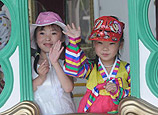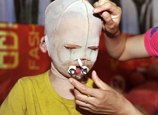
Parents who waited until their child is over 1 year old to apply for a birth certificate will now have to take a parental test to prove the relationship, according to a new ruling from the Zhejiang provincial health department.
The regulation was passed on June 2, 2012, and affects all children born after that date, meaning any parent of a 1-year-old child without a birth certificate will now have to prove their paternity, according to the agency's website.
In general, parents should provide their ID cards within 30 days of the birth to local hospitals or birth management authorities to get a certificate, says the local regulation.
But from now on, if the child is older than 1 and has no birth certificate, the mother must submit documents, including the parents' ID cards, their birth records, the certificate of the parental test and an explanation of why they were late in applying for the certificate. The regulation does not stipulate whether both of the parents need to provide a test certificate.
Chinese birth certificates are necessary to apply for hukou, or household registration, and ID cards, according to the regulation released on the department's website on May 17, 2012.
The parental test can be done at hospitals in big cities, and county-level hospitals can refer people to them. When the paternity certificate is received, parents can apply for the birth certificate from the hospital where the child was born, the People's Daily reported Monday.
The system could be an invasion of privacy, experts told the Global Times, while others said the move might be connected with trying to prevent child trafficking.
"Parental test should be done on a voluntary basis," Fang Zhouzi, a science commentator, told the Global Times on Monday.
"If local authorities order people to do this, then it may come out that some babies are not the biological children of the father," Fang said. "That will spark family conflicts, which is negative for children's growth."
Wang Sixin, a vice dean of the School of Political Sciences and Law at the Communication University of China, told the Global Times that the regulation will help to avoid or reduce mistaken information on the birth certificate.
"It also could help rule out cases in which some people intentionally claim they are the parents of babies who are not theirs. That will be useful for cracking down on infant trafficking to some extent," said Wang.
Lin Li, an official with the provincial health department, told the Global Times she was unable to comment on the policy Monday.
















 Photo story: Mask girl's hard life
Photo story: Mask girl's hard life


![]()
